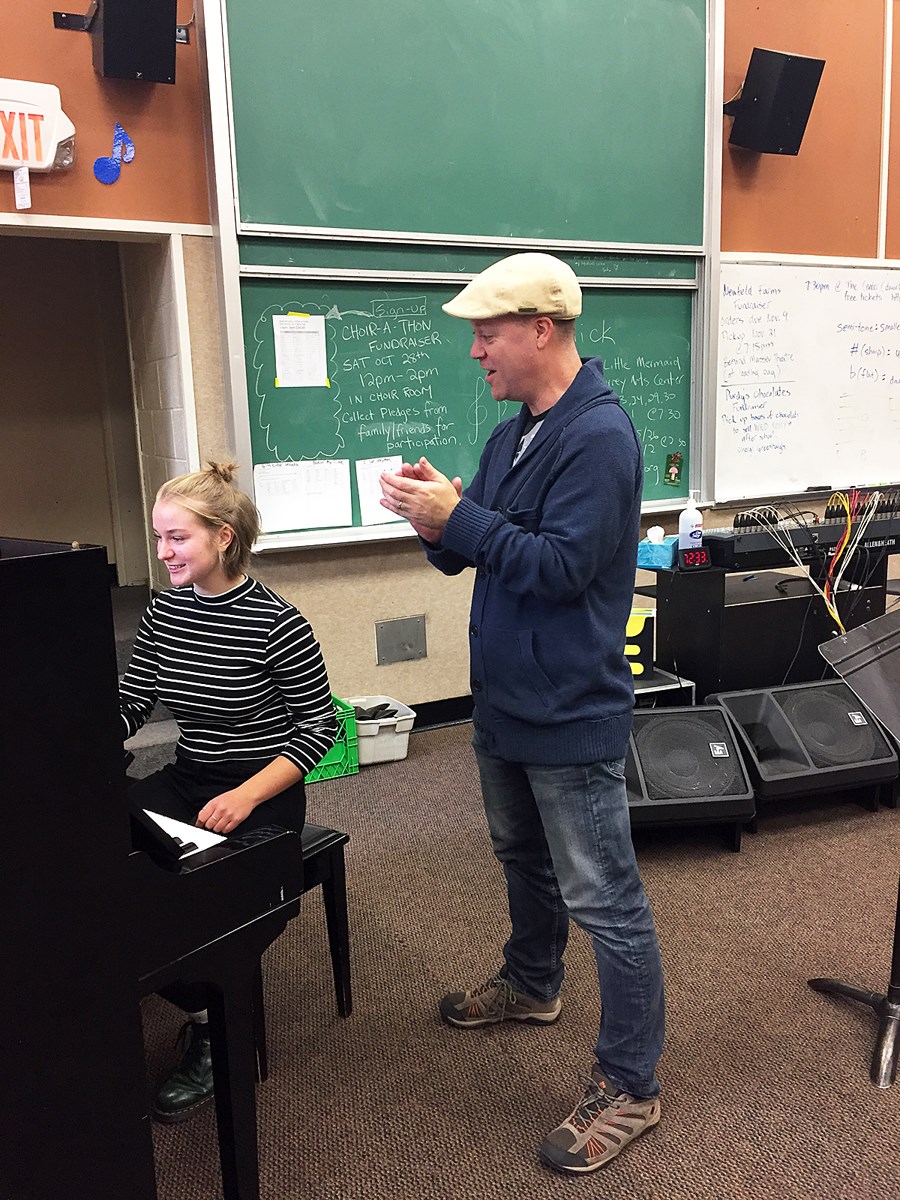Among the dilapidated hallways, cavernous buildings and throngs of students populating New Westminster Secondary School, it’s easy to feel isolated.
For NWSS band teacher and music director Steve Clements, helping kids find a welcoming community has always been a priority.
“I’ve had so many kids that have said that band is the only reason they come to school,” says Clements.
One of the things he finds most rewarding about his job is watching kids get addicted to music and having fun as a group.
For Clements, who has taught at the high school for 17 years, the “music spark” lit at a young age, progressing from piano lessons to playing trumpet in his school, and later, in his own band in Victoria. Clements is now passing on his love of music to students.
The Record sat down with Clements to hear about the NWSS music program, his vision, funding constraints and the importance of music in education.
What did you want to be when you were younger?
I never thought that I wanted to be a teacher. In fact when I graduated from high school I thought that I would never set foot in another high school; I was sick of high school.
And so then, when I finished my degree (in jazz music at Capilano University), I decided to do education, mostly as a financial decision, but it was an excellent fit for me, just because, I like people and I like music, and I actually enjoy teaching, which I didn’t know about myself.
Tell me about the NWSS music program. What do you like about it? Where do you see it going?
It’s a great program. We’re really lucky because we have a great team. It’s fun to think that we have a lot of possibilities to continue to grow the program, but we need support. …
There’s always this kind of battle going on between people who want to make sure that budgets are perfect and that the kids have career-oriented objectives and then music educators that want to offer something to the kids that’s fun and that’s unique and creative but requires an investment, and there’s kind of a constant tug of war going on. And that’s one of the tiring things about the job is always trying to convince people that this is a good idea. …
We’re trying to be creative and fight back with fundraising and enable ourselves to have access to these kinds of things and maintain a level of integrity for music education.
Do you think that music should be a part of every student’s education, and if so why?
I think it should, I honestly think it should. I think that music offers something that’s really unique. The idea of being creative and expressing yourself through a light which is universal, … it’s about humanity, it’s about connection, it’s about creativity, and I don’t think that there’s a price that’s too high to pay, in terms of money, for that.
What are some challenges that you’ve encountered in your career?
The fundraising thing is always a challenge. Trying to convince administrators that what we do is valuable is a constant challenge that never goes away, in particular because administrations change, so you get a new administration in and you’re right back to square one trying to convince them that we need access to the theatre, which they don’t want to pay for.
(There’s also) challenges like students that have special needs, and you want to try and incorporate them and find ways to get them an experience that’s meaningful to them and meaningful to everyone. That’s a challenge that I really enjoy.
What has been your proudest moment as a teacher?
(One) moment that really sticks out for me was in my second year of teaching and I was conducting in a concert, … and I was nervous. I was a young teacher. I didn’t really know what I was doing. In the rehearsals leading up to the concert we were playing this piece, Amazing Grace, … (and) we had never really played through the piece very well; it was always a little bit risky, and it just didn’t seem like it was going to work out, but it was too late to pick a new piece. Anyway, we got into the concert, and I looked at the kids before we started playing and I just, I could see in their eyes that they were going to rise up, and they were going to nail this thing; this piece, they were going to play it beautifully.
We got to the end, and there was this silence, just this couple of seconds of silence just as the piece stopped and then the audience erupted, and I looked at the kids and they were all like really proud. … It was just such a beautiful feeling. And this has happened maybe a few times since, but not on as high of a level as this one.
I just consider myself to be exceptionally lucky. I don’t really know how I ended up here, but it’s I think where I’m meant to be.
Theresa Cowley is an NWSS student who did a practicum in the Record newsroom.



